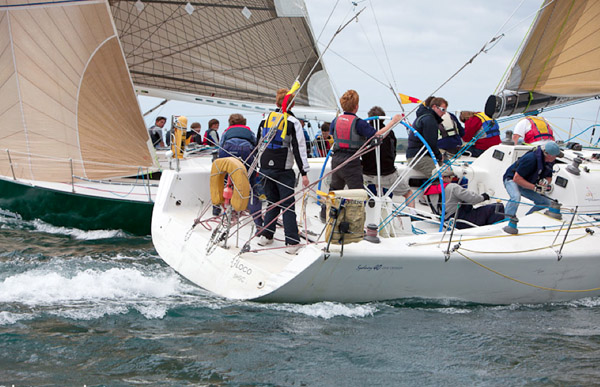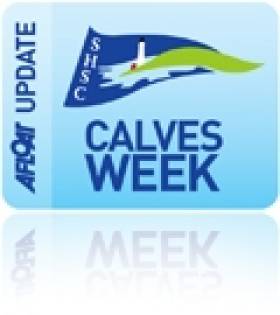Displaying items by tag: Wavetrain
'Gloves Off' Wins Calves Week Regatta Cup
the start line moved outside the harbour the fleets took in both the Goat and Calve Islands together with the marks off Castle Island.
In Class Zero IRC Kieran Twomeys "Gloves Off" finished a brilliant week of sailing to take the Regatta Cup and also the overall trophies in both handicap divisions, while Schull Sailing Club Commodore Morgan O' Donovan's "Loco" won the Regatta Echo cup.
In Class One IRC the overall result went right down to the wire with victory in the final race giving Donal O Leary's "D Tox" the title after a six points tie break with Simon Coveney s "Wavetrain". D Tox finished a very successful weeks racing by also winning the Echo overall trophy.

Infinity and Beyond (left) and Loco on opposite tacks. Photo: Bob Bateman. More photos on the gallery here
Competition was also intense in Class Two IRC with Conor Ronan's "Ruthless" just edging out the Deasey/Ivers/Desmond crew in "Bad Company" for the overall trophy thanks to his better last race result, while in Echo a third place in the regatta race, behind Andrew Mackeys "Lornadrew" was good enough to win the overall for John McGowan's "Mackey G".
The overall in Class Three IRC was never in doubt with David Kenefick in "Tiger" scoring five bullet , while a third in the final race for Paul Murrays "Full Pelt" saw him claim the Echo overall.
In Class Four the Hanley Brothers in "Saoirse" finished off a productive weeks racing by winning the IRC regatta cup and the overalls in both handicap divisions with Una Buckley sailing "Tete-a-Tete to victory in Echo.
In the White Sail One fleet the Don McCarthy sailed VSOP won the regatta race, while a third place for Bryan Heffernans "Aisling" was good enough for
him to clinch the overall trophy. In White Sail Two Tadgh Dwyer's "Brazen Huzie" won the overall, having discarded the regatta result which saw Frank
Murphys "Dreamcatcher take the trophy.
The McMahon trophy for best local boat went to Paul Murray's "Full Pelt" while the Pearson "Spirit of the regatta trophy "was presented to Bill Rigney.
























































